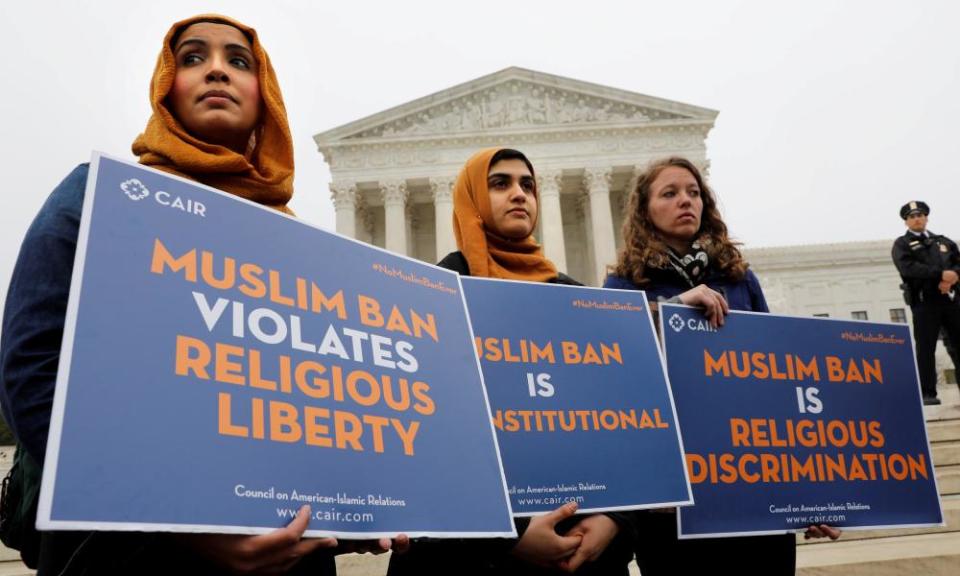Supreme court appears to lean in favor of Trump's right to impose travel ban

Two key judges on the US supreme court signaled support on Wednesday for Donald Trump’s authority to impose his controversial travel ban on several Muslim-majority countries, as fierce arguments raged before the bench in Washington.
Chief justice John Roberts and Justice Anthony Kennedy, the two most likely swing votes on the nine-judge court, both expressed skepticism over attempts to undermine Trump’s authority on what the president’s side insists is a matter of national security.
Opponents argue the Trump travel ban is motivated by discrimination and want the supreme court to uphold lower court rulings striking down the ban, which Trump first imposed by executive order as one of his first moves as president in 2017.
As the justices began their first full consideration of the ban on Wednesday, Justice Elena Kagan – an Obama appointee – posed a hypothetical for the court. Suppose a presidential candidate was a “vehement antisemite”, elected after regularly making denigrating statements about Jews, and upon taking office issued a proclamation barring immigrants from Israel, she posited.
Solicitor general Noel Francisco, arguing on behalf of the Trump administration, dubbed it a “very tough hypothetical” that could only be imposed if the relevant federal agencies believed it to be the result of genuine national security concerns.
“This is an out-of-the-box kind of president in my hypothetical,” Kagan replied, invoking laughter in the imposing courtroom in Washington.
The exchange was emblematic of both the unprecedented nature of Trump’s travel ban, which indefinitely bars more than 150 million people from gaining entry to the United States, and what many see as the core issue before the court: was the president’s action motivated by an actual national security threat or by animus toward a particular religion?
The court is considering the third version of the travel ban, which bars or limits entry to citizens of five Muslim-majority countries – Iran, Libya, Somalia, Syria and Yemen – as well as North Korea.
It also imposed travel restrictions on certain government officials from Venezuela and their families. The restrictions against North Korea and Venezuela are not being challenged in court. Chad was also among the list of banned countries but removed by the Trump administration earlier this month.
Human rights groups and other critics have labeled it an unmistakable attempt to make good on his campaign pledge to ban all Muslims from entering the US. Since then, lower courts have struck down three version of the travel ban, declaring it discriminatory on the basis of nationality and religion.

The travel ban was elevated to the conservative-leaning supreme court, which now stands as Trump’s best hope to uphold what remains one of the most divisive actions of his presidency. And in a sign of a possible looming victory for the administration, justices appeared split along ideological lines even as they peppered both sides with tough questions in oral arguments that extended just over an hour.
In the 15 months since Trump handed down his first travel ban, federal judges in Hawaii, California, Maryland and Virginia have rejected different versions of the executive order as unconstitutional. The appeals process ultimately placed the fate of the travel ban with the highest court in the land.
The supreme court signaled in December it may uphold Trump’s policy by allowing it to go into effect while the various legal challenges unfolded.
The challengers were represented by Neal Katyal, the former acting solicitor general under Barack Obama, and include the state of Hawaii and other individuals who said they were directly affected by the ban.
Roberts and Kennedy strongly indicated a reluctance to challenge the president’s authority on the matter, and poked holes in some opposition arguments.
Kennedy suggested the travel ban was not as indefinite as its opponents contended, pointing out that its language included a review after 180 days.
“That indicates there will be a reassessment and the president has continuing discretion,” Kennedy said.
Roberts asked if the notion that Trump’s actions were the result of bias meant airstrikes against Syria would similarly be considered illegal.
“Does that mean he can’t because you would regard that as discriminating against a majority-Muslim country?” Roberts asked.
Noting Trump’s order still allowed the majority of the Muslim world to seek entry to the US, the conservative Justice Samuel Alito said plainly that the policy “doesn’t at all look like a Muslim ban”.
Francisco strongly rejected assertions that the travel ban sought to bar any travelers on religious grounds, stating: “It excludes the vast majority of the Muslim world.”
The president, he added, “has been crystal clear this is not a Muslim ban”.
In a nod to the widespread interest in the case, the supreme court took the highly unusual step of immediately posting audio of the arguments online.
The travel ban case marked the final arguments of the supreme court’s current term. A ruling is not expected until June.

 Yahoo News
Yahoo News 